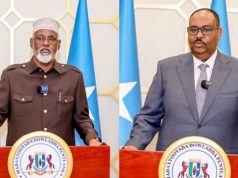
Somalia has been impacted significantly by the COVID-19 pandemic as soon as it reached its shores. The virus has further complicated the conditions of a country already affected by an ailing health system. Overall, there is a lack of effective government institutions and financial resources necessary for fighting the virus. Following the first reported cases of the virus on 16 March, the federal government has taken measures to curtail the outbreak. The first of these measures was to suspend schools and universities as they could become potential hotspots for the outbreak. The country’s Prime Minister, Hassan Ali Khaire proclaimed on the midnight of 18 March 2020 a fortnight’s suspension of the educational institutions, and a need to assess the developing situation. Schools and universities heeded the directive, but the cases kept increasing steadily. On the heels of this development, the federal Minister of Education, Culture and Higher Education held a meeting on the 8 April 2020 with the leadership of the learning institutions – school umbrellas and universities – and federal and states’ education ministers to decide what course of action would be taken. The minister came out with a statement in which he stipulated that schools would remain closed and the final exams for non-12 grade students would be cancelled. He also ordered school management to evaluate the students based on the results they gained in the midterm exams. Moreover, the national exam for school leavers was deferred in case the situation turns out normal.
Embracing virtual learning platforms
After the initial two weeks’ closure of schools and universities, the transmission of the virus has soared, wearing thin the hope that students would be able to resume studies on campuses. The leadership of universities was compelled to come up with innovative solutions that could adapt to the crisis. Universities resorted to alternative online learning platforms, which have become one of the only ways to deal with these unprecedented circumstances. This is similar to steps taken by learning institutions all over the world. The universities previously relied solely on traditional physical classes to deliver their programmes. Therefore, the online learning represents a new experience and venture for universities in Somalia. However, most African countries are in the same position, as online teaching is rare on the continent for reasons related to internet connectivity, high costs of internet data, and poverty……





